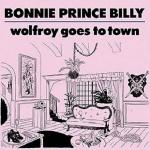
Bonnie 'Prince' Billy Wolfroy Goes To Town
(Domino)
Shambling in from the badlands once more comes Will Oldham, the lone troubadour peddling his sad songs of love, loss and longing on album number eleven (at least in his Bonnie 'Prince' Billy guise). This time he brings a companion with him, Chicago based singer-songwriter Angel Olsen, to add a spectral quality to his spare and haunting arrangements. Her contributions recall Alison Krauss at her most intimate and hushed.
The comparison is a telling one, as the Country elements are pushed to the fore on this album. Opener No Match is a slow C & W shuffle, with Oldham in defeated mood, "I'm no match for those who love the Lord, and they are no match for me..." The tone of the album is really set by the next track, New Whaling, which begins with some beautifully understated finger-picked guitar from Emmett Kelly, which recalls the late Bert Jansch in its intricacy. Haunting vocal harmonies increase the sense of unease, like a deserted cabin in a lonely forest, sounds muffled by a thick layer of snow.
The opening few bars of Time To Be Clear are a dead ringer for Coward Of The County, which is no bad thing, with Oldham's phrasing at its most self-consciously Country. The song's middle eight is a wordless vocal 'solo' by Olsen, accompanied by a plaintive mandolin. It sounds like a western saloon bar band playing the last song of the night while a drunk sits staring at the bottom of his glass, and a couple in love sway to the slow 3/4 rhythm. It's beautiful. New Tibet begins with Oldham singing with characteristic ambiguity "As boys, we fucked each other/As men, we lie and smile." Olsen's sweet backing vocal provides a strange counterpoint. The song builds to a climax of sorts, with some of the most strident guitar playing of the album, but it's a short-lived climax, with the song descending again and fading into slumber.
Cows is the album's highlight. Beginning with single xylophone chime and some gentle guitar the verses are ominous with Oldham singing so close to the microphone he could be right next to your ear. Don't listen in the dark. The chorus lifts into a major key, with some pedal steel guitar providing a high hopeful note. The song moves into a martial drum pattern, with twin lead guitars soloing briefly and bluesily, before being overturned by a staggering vocal coda that recalls English folk-rock pioneers Fairport Convention, or even something from Paul Giovanni's much under-rated soundtrack to The Wicker Man. It's an act of defamiliarisation, a kind of aural displacement, like A Connecticut Yankee in King Arthur's Court, only in reverse.
There Will Be Spring is sparse even by the standards of the rest of the album, just Oldham and a guitar, with the addition of what sounds like a bowed double bass adding a sinister, creaking undertow that threatens to pull the listener down into the depths. Quail And Dumplings, the track chosen as a single, is the most straight-forward song on offer here. Positively jaunty in comparison to what's gone before, it's as close to a rock song as Oldham gets.
If there's one criticism I can level at this album it's that it feels a little one-dimensional, a one-mood record, lacking in dynamics. It doesn't really bring anything new to the table, but then nobody really expected Oldham to deliver an album of dubstep remixes (although that's something I would like to hear). Perhaps it's a criticism that's redundant: Oldham ploughs a singular furrow and has the courage not to feel the need to deviate. When the results are as starkly beautiful as the songs here, who's to say he should? Wolfroy Goes To Town sits comfortably in the upper echelons of Oldham's body of work, next to the first Billy album I See A Darkness (1999) and career high point, 2006's The Letting Go. It's an album of striking and stark beauty, with finely crafted songs that feel stripped to their bare essentials, and just allowed to be what they are, unadorned.
10 October, 2011 - 17:52 — David John Wood